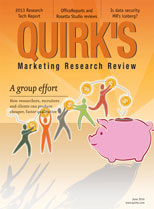For our write-up of the 2014 Quirk's salary survey of corporate researchers, we decided to let the numbers do the talking. Or, put another way, rather than make you slog through a recap of non-salary-related numbers that were, for the most part, right in line with previous years, we’ve put the data up on our site for you to access as you see fit. With so many research job titles and so many industries and geographies represented, we felt readers would prefer to be able to view the dataset and do their own analysis of how they stack up.
But we can’t step away without just a few observations.
• Respondents come from a variety of industries, with the top five most-cited being health care/pharma, consumer goods, banking/financial, media/publishing/information and insurance.
• Most respondents are members of small MR staffs, with 27 percent saying there are one to two full-time-equivalent researchers at their organizations, another 24 percent saying there are three to five and 15 percent claiming a staff of between six and 10.
• Those headcounts may go up this year, as 14 percent said it was very likely their company would hire additional MR employees in 2014, with 9 percent saying it was likely and another 16 percent saying somewhat likely. These numbers are slightly down from what they were last year but still above the numbers claimed in 2012 and 2011. And, by contrast, 25 percent said was very unlikely and a further 16 percent said it was unlikely that their firms would add new researchers this year.
• Job satisfaction seems to be on par with 2013, with 20 percent saying they are very satisfied with their current employment, 34 percent satisfied and 19 percent somewhat satisfied.
• And, whether due to happiness with their current lot or awareness that the grass isn’t always greener on the other side, the percentages of respondents who say they are some shade of unlikely to seek employment elsewhere this year are, again, nearly identical to those of last year: 25 percent said they are very unlikely, 18 percent said unlikely and 11 percent said somewhat unlikely.
To add a little color to the data, we invited comments on the compensation portion. Perhaps the most amazing comment was this one:
“Have negotiated raises in the past due to cost savings that were found through research completed.” [BRAVO!]
The rest were, for the most part, a mixture of further details about their individual compensation situations and expressions of disappointment. Here’s a small sampling of the most poignant comments from the disappointed:
“It sucks! No increases for three years!!”
“I had my first raise in a couple of years. A whopping 1.25 percent!”
“I'm bringing down the overall average with what I make.”
“I believe I am grossly underpaid.”
“Enough for me but not when you include my ex-wife!”
“I wish I was more valued by my employer but sadly, and despite my efforts, I’m not.”
“I find myself extremely frustrated when I see the results of these surveys. I'm thankful that you provide these but they can still be very demoralizing. I'm working for less than I know I'm worth.”
And then there were a few like this one. Hopefully, your situation is more similar to it than to those of the poor souls above:
“Unlimited sick time & three weeks of vacation & boss who understands still needing to work from home when the kiddo is sick . . . priceless.”
